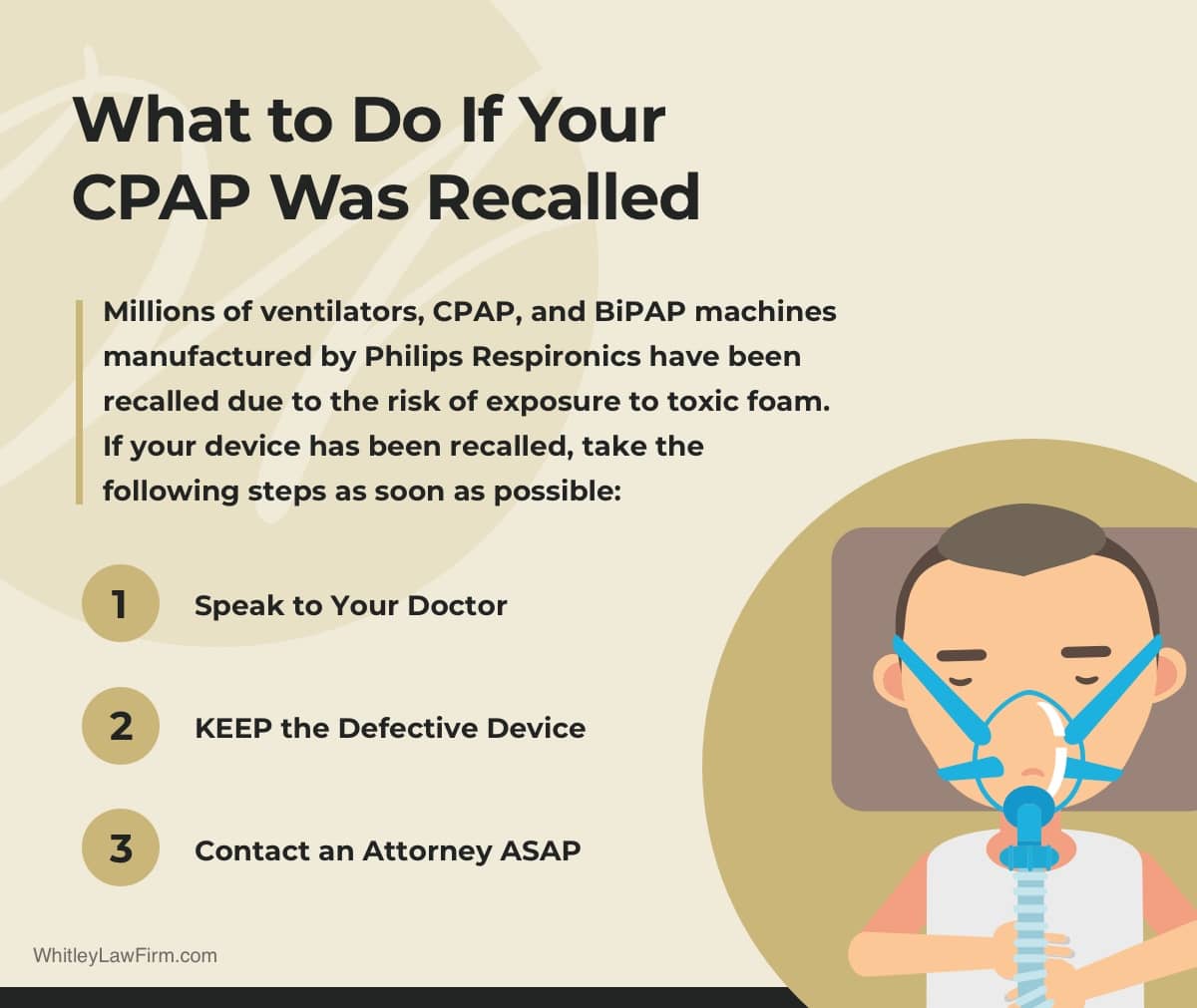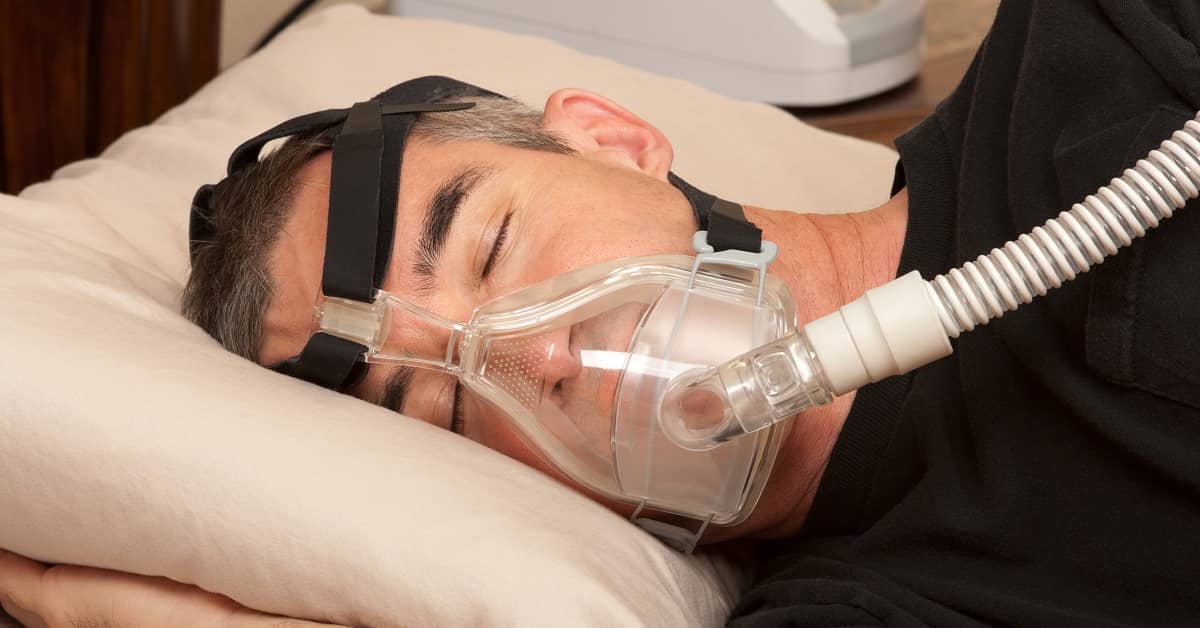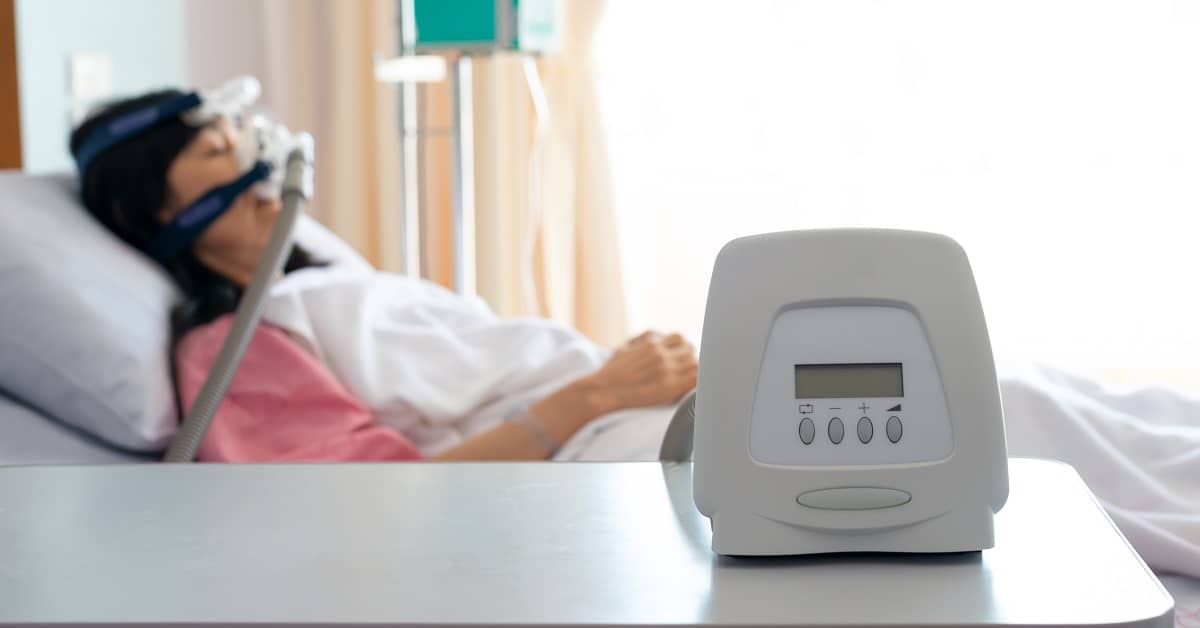Philips CPAP and Ventilator Recall
The FDA has announced a recall on certain types of ventilators, CPAP, and BiPAP machines manufactured by Philips Respironics. Testing shows that the sound abatement foam in these units (made of polyester-based polyurethane (PE-PUR)) may degrade over time and with regular use. Users of these devices may inhale or swallow PE-PUR debris as well as be exposed to harmful chemicals as the foam degrades, potentially resulting in a number of adverse health effects.
The Whitley Law Firm is currently investigating illnesses linked to Philips Respironics ventilators, CPAP machines, and BiPAP machines. Please contact a defective medical device lawyer for free today to discuss your legal options.
What Philips Respironics Devices Are Included in the Recall?
Respiratory devices like the ones manufactured by Philips have a variety of uses. Continuous positive airway pressure (CPAP) machines are frequently used in the treatment of obstructive sleep apnea, a condition that causes normal breathing to stop during sleep. Bilevel positive airway pressure (BiPAP) devices are also used in the treatment of sleep apnea, as well as conditions such as chronic obstructive pulmonary disorder (COPD), pneumonia, and more.
The following CPAP and BiPAP devices are subject to the FDA recall for health risks posed by degradation of the sound abatement foam:
- Continuous Ventilator, Minimum Ventilatory Support, Facility Use:
- Respironics E30
- Continuous Ventilator, Non-Life Supporting:
- DreamStation ASV
- DreamStation ST, AVAPS
- SystemOne ASV4
- C-Series ASV
- C-Series S/T and AVAPS
- OmniLab Advanced+
- Noncontinuous Ventilator:
- SystemOne (Q-Series)
- DreamStation
- DreamStation Go
- Dorma 400
- Dorma 500
- REMstar SE Auto
Ventilators are used to help patients who have trouble breathing on their own, often in clinical settings. A ventilator may be used during surgical procedures, as well as to assist patients who are critically ill or in a coma.
The following Philips Respironics ventilators are included in the recall as well:
- Continuous Ventilator:
- Trilogy 100
- Trilogy 200
- Garbin Plus, Aeris, LifeVent
- Continuous Ventilator, Minimum Ventilatory Support, Facility Use:
- A-Series BiPAP Hybrid A30 (not marketed in US)
- A-Series BiPAP V30 Auto
- Continuous Ventilator, Non-Life Supporting:
- A-Series BiPAP A40
- A-Series BiPAP A30
All of the recalled devices were manufactured prior to April 26, 2021. The recall applies to all serial numbers for the device models listed above.
The recalled breathing devices are used in many different settings, from personal and home use to hospitals, nursing homes, and more. As such, millions of devices are included in the Philips recall.
What Are the Dangers of PE-PUR?
Multiple users of Philips Respironics devices have reported that small black fragments of foam have infiltrated one or more components of the machines, including the face mask and tubing. Exposure to particulates of polyester-based polyurethane carries the following risks:
- Chronic headaches
- Sinus infections
- Upper respiratory infections
- Irritation of the eyes and skin around the nose and mouth
- Asthma
- Kidney damage
- Liver damage
- Cancers of the lungs, liver, and kidneys
Users of these breathing devices may also be harmed by the release of gases from the degradation of PE-PUR in the sound abatement foam. Exposure to gaseous chemicals from the breakdown of PE-PUR may result in the following:
- Headaches and dizziness
- Nausea and vomiting
- Irritation of the eyes, nose, and upper airway
- Lung cancer
- Liver cancer
- Kidney cancer
Users of Philips Respironics should talk to their doctor ASAP if they experience any of these symptoms or suffer other adverse effects.
What Should I Do If My Philips CPAP or BiPAP Device Was Recalled?
Clinical providers have been notified of the need to explore alternative options for patients on ventilators. In many cases, an alternative may not be viable, in which case patients in need of continuous or life-supporting ventilation should be treated with inline bacterial infection to reduce the risk of particulate or chemical exposure.
Users of CPAP and BiPAP devices are at less risk of immediate harm if they stop using a defective Philips device. However, you should still take the following steps as soon as possible:
1. Speak to Your Doctor
Sleep apnea, COPD, and other conditions are serious. Although Philips recommends discontinuing use of the affected devices as soon as possible, it is important to ask your physician about alternative options for respiratory care.
Your doctor may determine that the benefits of continued device therapy outweigh the risks. It is crucial to make an informed decision with a knowledgeable medical provider.
2. KEEP Your Device
Should you decide to discontinue your use of a CPAP or BiPAP device from Philips, do not throw it away or try to send it back to the manufacturer for a refund. Philips is advising customers to register the device online at www.philips.com/src-updates to receive further notifications on the status of the recall and next steps.
For a product liability claim to succeed, your attorney and hired experts must be able to inspect the product for evidence of a defect. Therefore, you need to have the CPAP or BiPAP machine in your possession and have it available when your lawyer asks to see it.
3. Contact an Attorney
Claims involving defective medical devices can be complex. Although Philips Respironics devices are subject to recall, this does not mean you are automatically entitled to compensation.
It is crucial to speak to a knowledgeable lawyer as soon as possible to protect your rights and begin building your claim. Exposure to particulates and chemicals from faulty Philips CPAP, BiPAP, and ventilator devices can lead to serious injury, permanent impairment, and even death. You do not want to lose the opportunity to pursue compensation for these devastating losses.
How the Whitley Law Firm Can Help
At the Whitley Law Firm, we dedicate a significant portion of our practice to representing those who have been harmed by medical device defects. We know how to handle the challenges in these cases to seek a favorable outcome on your behalf.
The Whitley Advantage is the relentless pursuit of the successful resolution of a claim. Our team works hard to deliver superior representation with courtesy, respect, and responsiveness.
If you or a loved one suffered injury or impairment due to a defective Philips CPAP, BiPAP, or ventilator, please contact the Whitley Law Firm at (919) 785-5000 today. It won’t cost anything to see if we can help. Our defective medical device attorneys serve clients in North Carolina and nationwide from offices in Raleigh, Kinston, and New Bern.





